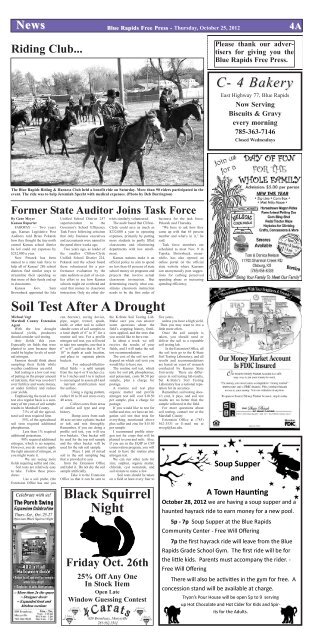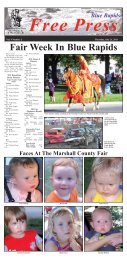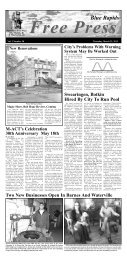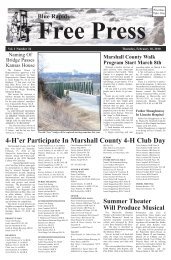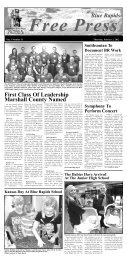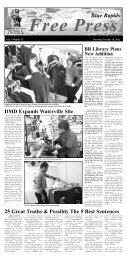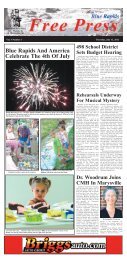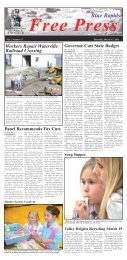eFreePress 10.25.12.pdf - Blue Rapids Free Press
eFreePress 10.25.12.pdf - Blue Rapids Free Press
eFreePress 10.25.12.pdf - Blue Rapids Free Press
Create successful ePaper yourself
Turn your PDF publications into a flip-book with our unique Google optimized e-Paper software.
News <strong>Blue</strong> <strong>Rapids</strong> <strong>Free</strong> <strong>Press</strong> - Thursday, October 25, 2012 4A<br />
Riding Club...<br />
The <strong>Blue</strong> <strong>Rapids</strong> Riding & Harness Club held a benefit ride on Saturday. More than 90 riders participated in the<br />
event. The ride was to help Jeremiah Specht with medical expenses. (Photo by Deb Barrington)<br />
Former State Auditor Joins Task Force<br />
By Gene Meyer<br />
Kansas Reporter<br />
FAIRWAY — Two years<br />
ago, Kansas Legislative Post<br />
Auditors told Brian Pekarek<br />
how they thought the tiny north<br />
central Kansas school district<br />
he led could cut expenses by<br />
$232,000 a year.<br />
Now Petarek has been<br />
named to a state task force to<br />
help all of Kansas’ 286 school<br />
districts find similar ways to<br />
streamline their spending so<br />
that more of their funds end up<br />
in classrooms.<br />
Kansas Gov. Sam<br />
Brownback appointed the Iola<br />
Michael Vogt<br />
Marshall County Extension<br />
Agent<br />
With the low drought<br />
induced yields, producers<br />
should consider soil testing<br />
their fields this year.<br />
Especially on fields that were<br />
planted to corn because there<br />
could be higher levels of residual<br />
nitrogen.<br />
Farmers should think about<br />
sampling their fields while<br />
weather conditions are mild.<br />
Soil testing is a low cost way<br />
of putting on the proper amount<br />
of nutrients, that way you don’t<br />
over fertilize and waste money,<br />
or under fertilize and reduce<br />
your yields.<br />
Emphasizing the need to soil<br />
test on a regular basis is a summary<br />
of ten years of soil sample<br />
results in Marshall County.<br />
71% of all the agricultural<br />
soil tests required lime.<br />
55% of the agricultural<br />
soil tests required additional<br />
phosphorous.<br />
Less than 1% required<br />
additional potassium.<br />
90% required additional<br />
nitrogen, which is no surprise.<br />
However, you do want to apply<br />
the right amount of nitrogen, or<br />
you might waste it.<br />
We are seeing more<br />
fields requiring sulfur and zinc.<br />
Soil tests are relatively easy<br />
to take. Follow these procedures:<br />
Use a soil probe, (the<br />
Extension Office has one you<br />
Unified School District 257<br />
superintendent to the<br />
Governor’s School Efficiency<br />
Task Force following criticism<br />
that only business executives<br />
and accountants were named to<br />
the panel three weeks ago.<br />
Two years ago, as leader of<br />
the smaller Clifton-Clyde<br />
Unified School District 224,<br />
Pekarek and the school board<br />
there volunteered for a performance<br />
evaluation by the<br />
state auditors as part of an earlier<br />
effort to see how Kansas<br />
schools might cut overhead and<br />
send that money to classroom<br />
instruction. Only six other dis-<br />
can borrow), coring device,<br />
pipe, auger, trowel, spade,<br />
knife, or other tool to collect<br />
slender cores of soil samples to<br />
a total depth of 6” to 8” for a<br />
routine soil test. For a profile<br />
nitrogen soil test, you will need<br />
to take two samples, one that is<br />
6” to 8”, and one that is 16” to<br />
18” in depth at each location,<br />
and place in separate plastic<br />
buckets.<br />
For reduced-tilled/notilled<br />
fields – a split sample<br />
from the top 6 or 8 inches (i.e.<br />
0 to 3 inches and 3 to 6 inches)<br />
is encouraged to assess pH and<br />
nutrient stratification near<br />
the surface.<br />
Using a zigzag pattern,<br />
collect 10 to 20 soil cores every<br />
40 acres.<br />
Collect cores from areas<br />
of similar soil type and crop<br />
history.<br />
Dump cores from each<br />
40 acre set into a plastic bucket<br />
or tub, and mix throughly.<br />
Remember, if you are doing a<br />
profile soil test, you will use<br />
two buckets. One bucket will<br />
be used for the top soil sample<br />
and the other bucket will be<br />
used for the sub soil sample.<br />
Place 1 pint of mixed<br />
soil in the soil sampling bag<br />
that is provided to you<br />
from the Extension Office<br />
and label it. Do not dry the soil<br />
sample artificially.<br />
Take it to the Extension<br />
Office so that it can be sent to<br />
tricts similarly volunteered.<br />
The audit found that Clifton-<br />
Clyde could save as much as<br />
$232,000 a year in operating<br />
expenses, primarily by putting<br />
more students in partly filled<br />
classrooms and eliminating<br />
departments with low enrollment.<br />
Kansas statutes make it an<br />
official policy to aim to spend<br />
no less than 65 percent of state<br />
school money on programs and<br />
projects that involve actual<br />
classroom instruction. But<br />
determining exactly what constitutes<br />
classroom instruction<br />
needs to be the first order of<br />
Soil Test After A Drought<br />
the K-State Soil Testing Lab.<br />
Make sure you can answer<br />
some questions about the<br />
field’s cropping history, fertilizers<br />
applied, and the tests that<br />
you would like to have run.<br />
In about a week, we will<br />
receive the results of your<br />
fields, and I will make the soil<br />
test recommendations.<br />
The cost of the soil test will<br />
depend on which soil tests you<br />
would like to have run.<br />
The routine soil test, which<br />
tests for soil pH, phosphorous,<br />
and potassium, costs $6.50 per<br />
sample, plus a charge for<br />
postage.<br />
A routine soil test plus<br />
organic matter and profile<br />
nitrogen test will cost $10.50<br />
per sample, plus a charge for<br />
postage.<br />
If you would like to test for<br />
sulfur and zinc, we have an irrigation<br />
soil test that tests for<br />
everything mentioned above<br />
plus sulfur and zinc for $15.50<br />
per sample.<br />
I recommend profile nitrogen<br />
test for crops that will be<br />
planted to corn and milo. Also,<br />
if you are in the EQIP or CSP<br />
conservation program, you will<br />
need to have the routine plus<br />
nitrogen test.<br />
We can run other tests for<br />
zinc, sulphur, organic matter,<br />
chloride, cyst nematode, and<br />
soil texture to name a few.<br />
Soil tests should be taken<br />
on a field at least every four to<br />
Black Squirrel<br />
Night<br />
Friday Oct. 26th<br />
25% Off Any One<br />
In Stock Item<br />
Open Late<br />
Window Guessing Contest<br />
business for the task force,<br />
Pekarek said Thursday.<br />
“We have to ask how they<br />
came up with that 65 percent<br />
number and what’s in it,” he<br />
said.<br />
Task force members are<br />
scheduled to meet Nov. 9 in<br />
Topeka. Brownback, meanwhile,<br />
has also opened an<br />
online portal on the official<br />
state website where Kansans<br />
can anonymously post suggestions<br />
for curbing perceived<br />
spending abuse or increasing<br />
spending efficiency.<br />
five years,<br />
unless you have a high yield.<br />
Then you may want to test a<br />
little more often.<br />
Once the soil sample is<br />
taken, you should send or<br />
deliver the soil to a reputable<br />
soil testing lab.<br />
In the Extension Office, all<br />
the soil tests go to the K-State<br />
Soil Testing Laboratory, and all<br />
results and recommendations<br />
are based on years of research<br />
conducted by Kansas State<br />
University. There are differences<br />
in soil testing lab results,<br />
but K-State’s Soil Testing<br />
Laboratory has a national reputation<br />
for its accuracy.<br />
Remember, soil testing doesn’t<br />
cost, it pays, and soil test<br />
results are no better than the<br />
sample collected in the field.<br />
For more questions about<br />
soil testing, contact me at the<br />
Marshall County<br />
Extension Office at (785)<br />
562-3531 or E-mail me at<br />
mvogt@ksu.edu.<br />
Please thank our advertisers<br />
for giving you the<br />
<strong>Blue</strong> <strong>Rapids</strong> <strong>Free</strong> <strong>Press</strong>.<br />
C- 4 Bakery<br />
East Highway 77, <strong>Blue</strong> <strong>Rapids</strong><br />
Now Serving<br />
Biscuits & Gravy<br />
every morning<br />
785-363-7146<br />
Closed Wednesdays<br />
<br />
<br />
<br />
<br />
<br />
-<br />
-<br />
<br />
<br />
-


